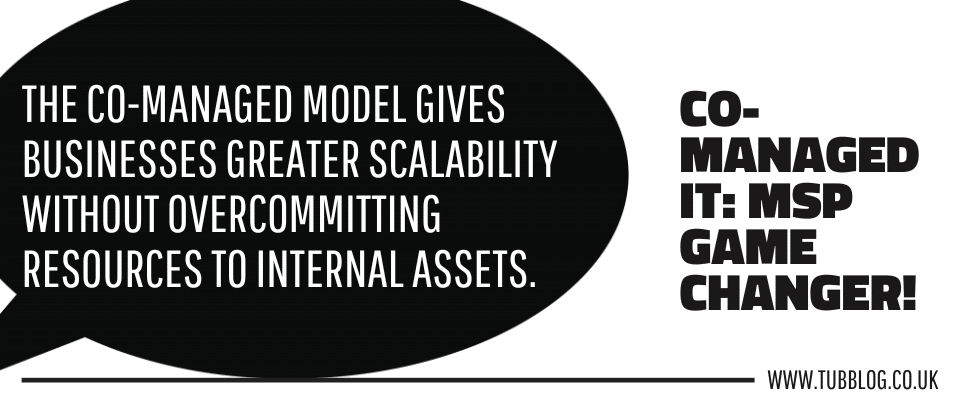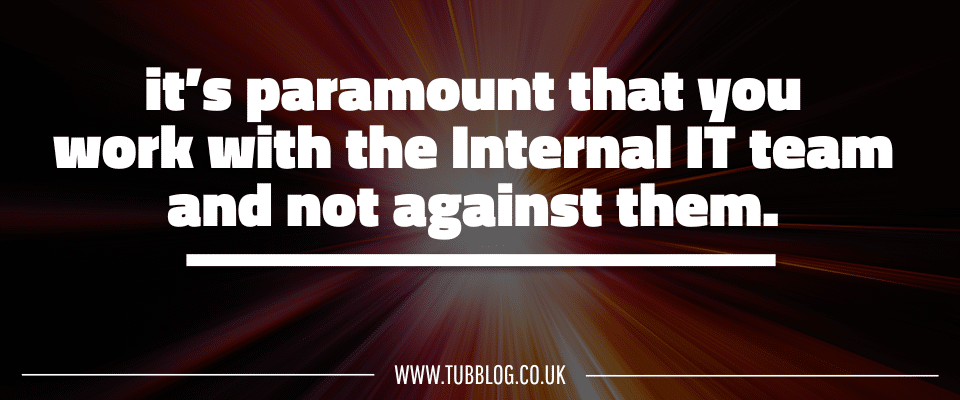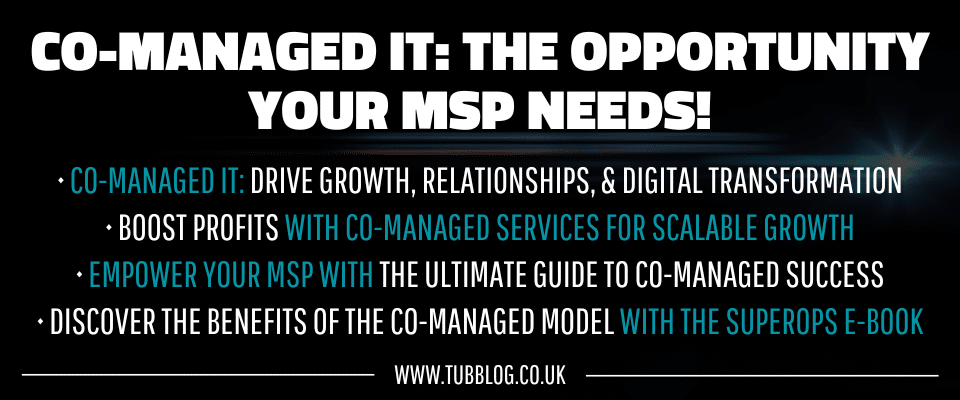When it comes to running your MSP business, you more than likely have a direct business-to-business relationship with your clients. This is where you tailor your stack to meet the needs of their organisation, selling them a solution that works best for whatever they need.
However, another way of offering your services is through a co-managed model.
In a co-managed IT model, you provide services alongside a business’ internal IT department. Could this be a lucrative approach that would suit your MSP?
In a recent e-book from SuperOps, they explain the pros and cons of co-managed IT, and what you need to do to get started.
Introduction to Co-Managed IT
The co-managed IT model allows external service providers like MSPs to deliver IT services alongside an internal IT team.
When it comes to IT management, there are several functions that your typical IT team covers:
- Remote Monitoring and Management
- Device Management
- User and Access Management
- Cybersecurity
- Data Management and Security
- Service Desk
- Cloud-based Solutions
- IT Consulting
- Project Management
There are other services that a managed service provider can accommodate too. This flexibility is one of the main draws for businesses to work with an MSP. Another reason businesses opt for a co-managed IT approach is that they may be looking to downsize bloated IT departments, or they need expertise they are missing in-house.
Why Businesses Should Adopt a Co-Managed Model
The co-managed model gives businesses greater scalability without overcommitting resources to internal assets. Furthermore, the level of expertise is greater with an MSP on board as an IT partner.
With two teams working in tandem, it improves turnaround times and issue resolution. Not to mention that it’s much more cost-effective to part outsource some of your IT functions to an MSP.
A co-managed IT department is perfect for implementing your digital transformation strategy, especially if your business is moving to a cloud-based solution from onsite data storage.
Why Co-Managed Businesses Are a Good Opportunity for MSPs
SuperOps believes that co-management is a good opportunity for MSPs.
A New Market – If you’ve not considered it before, co-management is a completely new market for your MSP. This is especially true if you want to pitch yourself as a company that helps businesses reinvent their digital strategy.
Shared Responsibility – With a co-managed model, you don’t have to focus all of your attention on delivering all of a business’s IT services. Just focus on those elements you’re contracted to cover. This means you can deliver services that might be outside of your particular niche, and experience what other IT services these businesses may use.
No Need to Develop Bespoke Solutions – when you’re the only IT partner for a small business, you sometimes have to cover the needs of your client in unconventional ways. As a co-managed partner, you only have to provide the elements you’re comfortable providing. No stack tweaks are required with this system, just focus on what you want to deliver.
Some Tips to Get You Started in Co-Managed IT
In the e-book, The Co-Managed IT Starter Guide for MSPs, SuperOps gives seven tips to get you started. Here are three for you now.
1. Provide Value to Your Customers
It may sound obvious, but businesses that employ internal IT departments often do this because they don’t understand the value of MSPs. Whatever support arrangement, always make sure to go the extra mile. Share training resources if you have them, and offer them a little bit more than they’ve asked for. It may pay off with more business in the future.
2. Gain Clarity of Ownership of Work and Scope of Support
It’s paramount that you work with the internal IT team and not against them. One way to do this effectively is by having clear lines of responsibility. This also extends to the scope of work involved, ensuring there’s no ambiguity.
3. Create Standardized Offerings for Co-Managed Clients
To be able to reproduce your offerings elsewhere, you should create standardized offerings for co-managed clients. This will ensure you can continue to scale your MSP for co-managed IT services and maximise your profits.
For the full tips and much more, download the full e-book here.
Co-Managed IT is Not Without its Challenges
Working in partnership with your client’s internal IT department requires some checks in place to prevent problems further down the line.
Your objectives should be clearly aligned with those of the internal IT team you’re working with. Likewise, your technical stack should be compatible with their infrastructure. You need to ensure that everyone does what’s required of them while staying in their respective lanes. This can be difficult to achieve if the right tools aren’t in place.
It might be expensive to find the right solutions for access management, but SuperOps has a PSA solution that can restrict access based on roles and data security. By setting permissions based on roles and project groups, you can ensure that responsible teams can only access what they need to.
SuperOps offers an AI-powered PSA and RMM solution. If you want to find out more about how SuperOps can help you provide successful co-managed IT. Book a demo with one of their product experts today.
Conclusion
Co-managed IT is a great opportunity for MSPs to find new clients, nurture business relationships and build a successful niche for businesses that need to complete their digital transformation plans.
You’ll demonstrate your value as an IT partner, and as you refine your services, you’ll be able to onboard more co-managed clients. This will inevitably result in your business being more scalable and profitable in the long term.
This e-book from SuperOps provides a great deal of value for MSPs who want to explore the co-managed model.
Have you worked with a client with their own internal IT department? What was it like? Please let us know in the comments.


















Comments